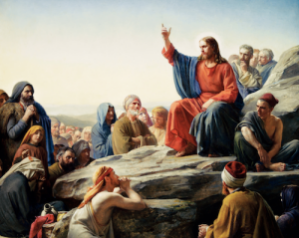Robert King (e-watchman)
“Truly I tell you today – you will be with me in paradise”
Jesus uses the phrase “Truly I say to you, …” over 50 times in the Bible. In the NWT, the comma is placed after the word “you” every time except in Lk 23:43, where the comma is placed after the word “today”. Why is the comma placed after “today” instead of after “you” in this verse? If the translation of this phrase in Lk 23:43 was consistent with the translation of this phrase in all the other verses in which it appears (see concordance), and the comma was placed after the word “you”, how would it read?
First, while Jesus frequently used the expression “truly I say to you,” he only used the expression “truly I say to you today” on one occasion, and that was on the day of his execution.
It should be pointed out that the original Greek did not have such punctuation marks. It is up to the translator to determine where punctuation marks, such as a comma, should be placed. And in the instance of Luke 23:43 it is evident that the comma should be placed after the word “today” – so as to say: “Truly I tell you today, you will be with me in Paradise.”
This is where a little knowledge is helpful. And of course, honesty is also important.
Those who insist that a comma should be placed before “today” would have us believe that Jesus was promising the thief that he was going to be in paradise that very day.
This reveals a profound and appalling ignorance of a very fundamental truth expressed throughout the Bible. Even young children in Sunday school know that Jesus was killed and was in the grave for parts of three days and on the third day he arose from the dead. Jesus certainly was not transported to paradise or heaven or anywhere else on the day that he breathed his last – at least not as a living person. After he was taken down from the stake he was wrapped in burial cloth and carried by his secret disciples and laid in a tomb. In fact, even after his resurrection Jesus walked among his disciples for 40 days before he ascended back to heaven.
Furthermore, the Bible clearly explains that Jesus is the firstborn from the dead. Are we to assume that the thief preceded Jesus into paradise while the Lord lay in a tomb awaiting his Father’s call to awaken?
Moreover, after the holy spirit was poured out on the day of Pentecost the apostle Peter explained the resurrection of Jesus by referring the Jews to a Psalm that King David had written 1000 years before. The Psalm said that you will not leave the soul of your loyal one in the grave. And then the apostle explained that David was still in his grave and his tomb was among them to that day. (Acts, chapter two) He said that so that they could understand that the Psalm actually applied to the Messiah. So, if righteous King David was still in the grave waiting for the resurrection, are we to assume that the thief also preceded David into paradise?
It is disingenuous for someone who is steeped in the mythology of Christendom to take issue with Jehovah’s Witnesses and the New World Translation for the placement of a comma in a passage referring to paradise, when the common churchgoer has no understanding of what Jesus was even talking about. It is beyond their comprehension and willingness to accept the fact that Jesus was promising the evildoer who was executed alongside him that he would receive a resurrection, not to heaven, but into paradise on earth.
Ironically, even the thief apparently knew more of the truth than the average churchgoer today. He certainly did not expect to be transported to heaven then, or anytime afterward. Going to heaven was a foreign concept to the Jews. Even the apostles and original disciples imagined that Jesus’ kingdom was going to manifest itself on the earth. It was only after their anointing that their minds were opened up to the fact that they had been invited to join Christ in heaven. But the thief certainly had no expectation of a heavenly reward. Nor did he expect to be instantaneously resurrected. That is why he asked Jesus to remember him when he got into his Kingdom at some point in the future.
Just as the men of Sodom will rise up in the resurrection and condemn the unbelieving Jews who rejected Jesus, we may expect the thief who is resurrected to paradise to condemn the stupidity and unreasonableness that characterizes churchgoers today, who know nothing of the truth but who attempt to teach Jehovah’s Witnesses with their empty-headed stumper questions.



